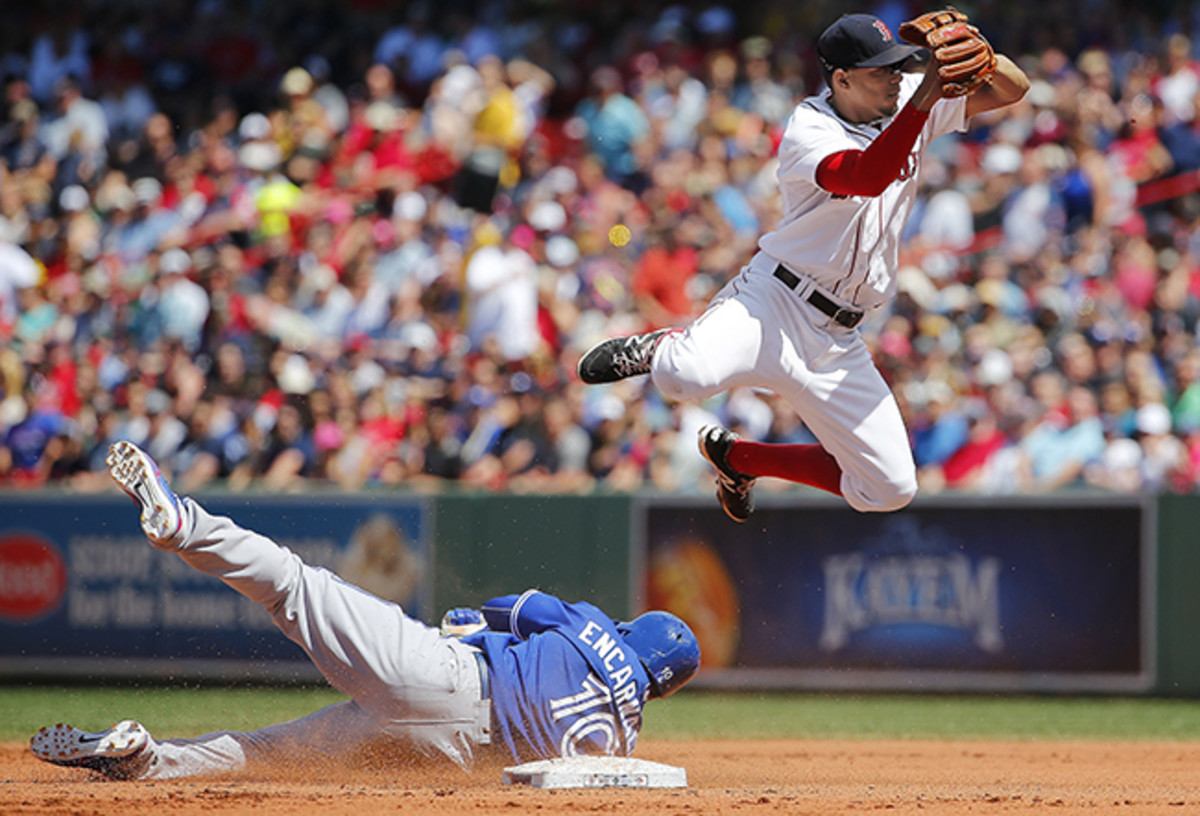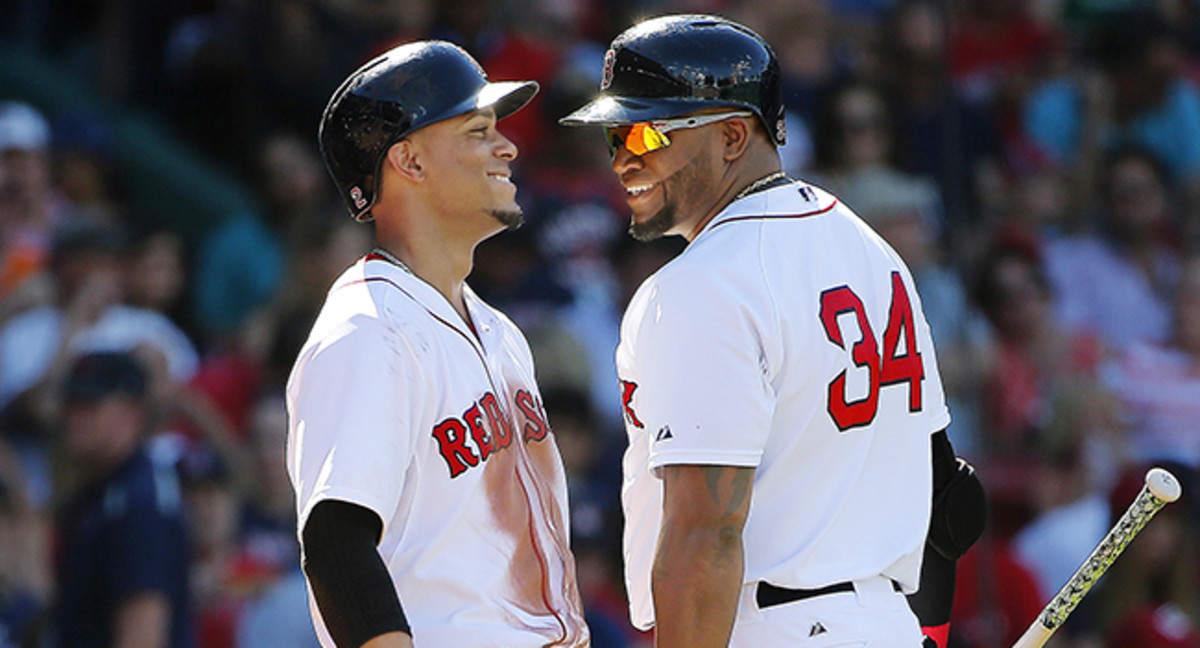Primetime: Boston Red Sox Shortstop Xander Bogaerts


Xander Bogaerts had just turned 21 when he won a World Series with the Boston Red Sox. It had been one of his dreams since he began playing baseball as a young boy in Aruba, an island nation that is less than 20 miles off the coast of Venezuela — and more than 2,000 miles from Boston.
Bogaerts made it look easy. He was called up to Boston late in the 2013 season after tearing up pitching at two minor league levels. He made his debut with the Red Sox on August 20 and played well for the remainder of the season.
During the League Championship Series against the Detroit Tigers, he took over the starting job at third base and held onto the position during the team's World Series win against the St. Louis Cardinals. He finished the postseason with a .296 batting average and nine runs scored in 12 games.
In fact, Bogaerts makes just about everything look easy. But life hasn't always been simple for him.
Bogaerts played a lot of sports growing up. He loved volleyball, basketball, and soccer. But baseball was always his favorite. He began playing the sport because his mother's brothers played. Bogaerts's dad left his mom when he was young, but he was always close to his mother's family.
"I love my dad," Bogaerts says. "I don't see him a lot. I wish I saw him more, but stuff happens in life. It's not how everyone plans it to be. It's tough growing up without your dad but always with your mom. Especially for me, my mom was always the one."
He signed with the Red Sox when he was just 16. Less than a year later he left home and moved to another country — the Dominican Republic — to start his baseball career. It was difficult to be away from home at such a young age. But his twin brother, Jair, also signed with the Red Sox, so they went to the Dominican Republic together.
A year later, though, Xander went to the United States — alone — for the first time, playing for the Red Sox Class A affiliate in Greenville, South Carolina.
"It was hard," he says. "I missed my mom. That's when it hit me hard because my mom wasn't there to help me out, my brother wasn't there. So you kind of have to grow up and become a young man on your own."
Baseball was the easy part then. He played well at every level and was one of the Red Sox' most highly regarded minor leaguers. He earned accolades and awards at every level, steadily moving up the minor league system until he made his major league debut.
Just 29 days after his 21st birthday, the Red Sox were World Series champs. How did he feel when they won?
"Relief," he says. "That's the only word I can think of. Bases loaded, you're winning by one. If you make an error, two runs score and you lose the World Series. It's all on you, not the ground. The ground didn't pop up and cause an error. It's on you. There's no place to hide, and it will always be with you. So it was relief, really. I think that was it for me. I was young. I didn't play in the big leagues a lot. So it was different."
It's his favorite baseball memory so far, and he couldn't wait to get the 2014 season started.
But something happened after he won the World Series. Suddenly, baseball wasn't easy anymore. In fact, it became very difficult.

A NEW POSITION
The biggest problem Bogaerts faced was that he wasn't playing his familiar shortstop. Two months into the 2014 season he was moved to third base when Boston signed Stephen Drew. It was a position Bogaerts had never played regularly before his 2013 call-up. He struggled with his new position, and that affected him at the plate. His confidence — and his batting average — plunged.
"It was hard," he said. "I never struggled, not even in the minors, in Aruba, anything. It was hard, all those 0-fers.
"I remember I started out the year really good. Then I got moved around to third base, and that was just it for me. Just never felt good over there. You obviously want to do what's best for the team, but I just never got that comfortable ever. Mentally I started losing my confidence. Made a few errors at third base. I felt like the world was going to end for me. It was hard. It was really hard.
"But I learned that it doesn't matter how long or how hard you struggle; you can always get back. It might take a long time or a short period of time, but you can always get back."
He kept working at third base and got a little more comfortable there. Eventually he returned to his old position when Drew was traded to the Yankees.
Back at shortstop, a little bit older and more comfortable, his confidence returned. He finished the 2014 season on a tear, and last year his batting average jumped 80 points to .320. He drove in 81 runs, second most on the team.
The Red Sox haven't played well in the last two seasons, but Boston has added several new players, including ace pitcher David Price, giving the team hope for 2016. Bogaerts will play a big role. He's become an elite shortstop, and he's also matured into a key figure in the clubhouse.

SIMPLE GUY
Bogaerts is one of the most respectful, polite, and friendly players on the Red Sox. Even when he's reminding his teammates that he's beating them on PlayStation, he does so in a way that makes them laugh. He also considers it important to be a role model.
"It comes with what we do," he says. "A lot of kids, a lot of people look up to you in general. As long as you try to do things the right way, people will notice that and they'll obviously want to walk in your shoes and do the same things you do."
Growing up, he wanted to be like Derek Jeter — which is why he wears number 2 — and Hanley Ramirez, who is now his teammate. But the person he looked up to the most was his mother.
"She's a social worker," he says. "It's tough work but my mom is good at what she does. I learned a lot from her. You get a lot of wisdom from her."
He goes back to Aruba every off-season. But he talks to his mom every day, and she might come to visit when the weather gets warmer in Boston.
When she comes to visit, she'll find that success hasn't changed her son. "I like PlayStation," Bogaerts says. "I really do — baseball, basketball. I just enjoy playing it. I'm a normal guy. I don't like a lot of stuff. I'm very simple. I've always been that way."

Xander Bogaerts isn't the only young player making a splash at his position. With these slick-fielding, slugging kids at the forefront, we're about to enter a golden age of shortstops.

As a rookie, Correa banged 22 home runs. Not bad for a guy who wasn't called up to the majors until June. He also played stellar defense, helping Houston to the playoffs — where he hit another two homers in six games. Just imagine what the 21-year-old can do in a full season.

Like Correa, Lindor was a mid-season call-up. And like Correa, he displayed a slick glove and some pop at the plate. There were questions about whether Lindor was a mature enough hitter. The 22-year-old answered them by bashing 12 homers in 99 games and hitting .313.

As a 21-year-old rookie, Russell was one of the best defensive shortstops in the National League. He bulked up in the off-season, and the Cubs hope to see an increase in his 13 home runs.

The L.A. phenom didn't spend much time in the majors last year, but he made it count. Seager hit .337 in 27 games, including nine multi-hit performances.
Photos: Winslow Townson/AP
